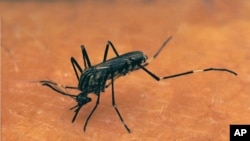Scientists have discovered a way to interfere with the female malaria mosquito's ability to produce eggs. The findings could lead to another method for controlling the spread of the parasitic illness, which, according to U.S. government statistics, claimed nearly 660 thousand lives in 2010, most of them children in sub-Saharan Africa.
Mosquitoes that carry malaris are becoming increasingly resistant to the insecticides in treated bed nets, so finding another method of control is becoming more urgent.
It is well known that the female insects require one or two blood meals from humans before they can produce eggs. But now scientists have discovered another way the female insects develop mature eggs, one which could potentially be used for malaria control.
During mating in the wild, researchers say the male mosquito deposits a hormone known as 20E, which interacts with a protein in the female reproductive tract called MISO, switching on female egg production. The 20E hormone boosts the accumulation of fatty substances called lipids in the ovaries that ramp up egg production.
But by blocking the MISO protein with specially designed compounds, Francisco Baldini and his colleagues showed it is possible to interfere with the production of eggs in the female malaria mosquito.
Baldini, a malaria researcher at the Harvard School of Public Health in Boston and the University of Perugia in Italy, says those chemicals could be used in homes.
“Either [on to] indoor walls of houses or into bed nets that people use to protect themselves at night," said Baldini.
In combination with traditional methods of malaria control, Baldini says chemical egg inhibitors could potentially extend the effectiveness of the insecticides used in bed nets in malaria endemic regions.
Researchers are also looking at ways to inhibit 20E in male mosquitoes, according to Baldini.
“Preventing the formation of this hormone in the male can lead to the production of males which are actually unable to stimulate the egg production once mated with the female," he said.
That strategy, introducing thousands of sterile male insects into the wild to breed, is a well-known method of pest control.
An article describing how eggs are produced in the female malaria mosquito is published in the journal PLoS Biology.
Mosquitoes that carry malaris are becoming increasingly resistant to the insecticides in treated bed nets, so finding another method of control is becoming more urgent.
It is well known that the female insects require one or two blood meals from humans before they can produce eggs. But now scientists have discovered another way the female insects develop mature eggs, one which could potentially be used for malaria control.
During mating in the wild, researchers say the male mosquito deposits a hormone known as 20E, which interacts with a protein in the female reproductive tract called MISO, switching on female egg production. The 20E hormone boosts the accumulation of fatty substances called lipids in the ovaries that ramp up egg production.
But by blocking the MISO protein with specially designed compounds, Francisco Baldini and his colleagues showed it is possible to interfere with the production of eggs in the female malaria mosquito.
Baldini, a malaria researcher at the Harvard School of Public Health in Boston and the University of Perugia in Italy, says those chemicals could be used in homes.
“Either [on to] indoor walls of houses or into bed nets that people use to protect themselves at night," said Baldini.
In combination with traditional methods of malaria control, Baldini says chemical egg inhibitors could potentially extend the effectiveness of the insecticides used in bed nets in malaria endemic regions.
Researchers are also looking at ways to inhibit 20E in male mosquitoes, according to Baldini.
“Preventing the formation of this hormone in the male can lead to the production of males which are actually unable to stimulate the egg production once mated with the female," he said.
That strategy, introducing thousands of sterile male insects into the wild to breed, is a well-known method of pest control.
An article describing how eggs are produced in the female malaria mosquito is published in the journal PLoS Biology.




